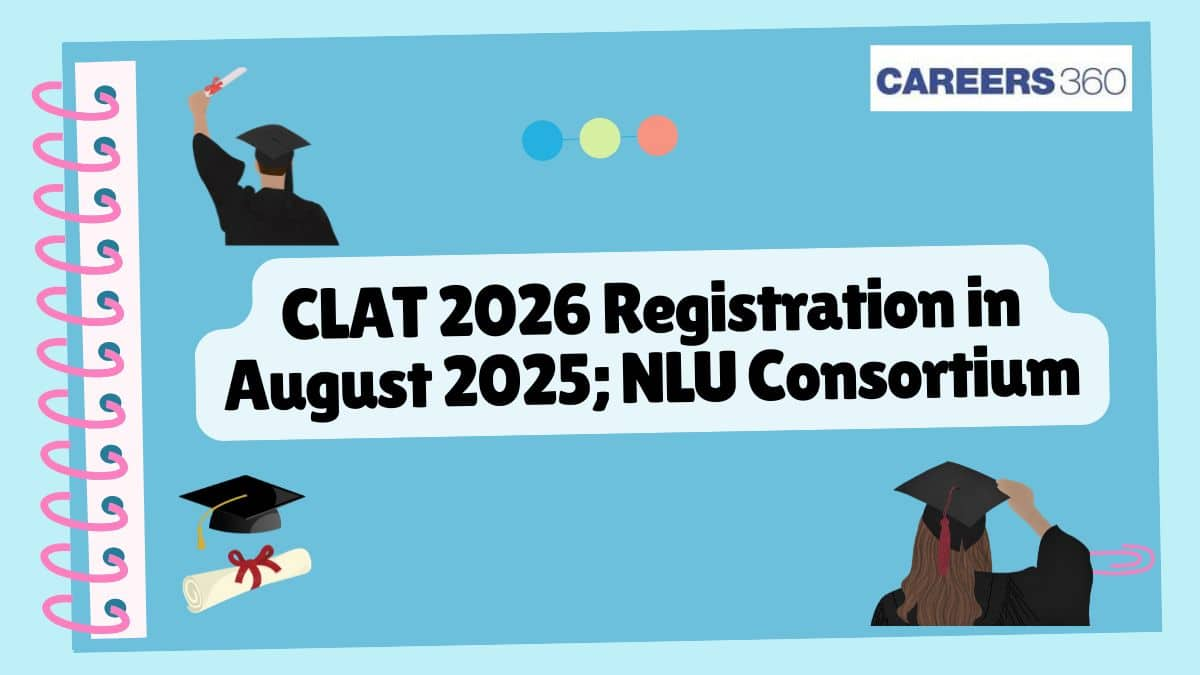Manav Rachna University Law Admissions 2026
Admissions open for B.A. LL.B. (Hons.), B.B.A. LL.B. (Hons.) and LL.B Program (3 Years) | School of Law, MRU ranked No. 1 in Law Schools of Excellence in India by GHRDC (2023)
The Consortium of National Law Universities (NLUs) is expected to commence the CLAT 2026 registration in August 2025 in online mode. In response to a query by Careers360, the consortium said, “The registrations for CLAT 2026 will begin from August 2025. Please check the website at that time for updates.” However, the authorities will release the exact dates regarding the registration form through the CLAT 2026 admission notification on its official portal. Candidates will be able to register online from the official website: consortiumofnlus.ac.in. To avoid last-minute delays or errors, candidates are advised to complete the CLAT 2026 application process before the deadline.

The Consortium of NLUs is expected to conduct CLAT 2026 on December 14, 2025. Through the Common Law Admission Test, candidates will be admitted into the 5-year LLB and LLM programmes of participating NLUs. There are a total of 24 NLUs participating in CLAT, which offers around 3400 seats in 5-year LLB and around 1300 seats in LLM.
The CNLU is expected to open the CLAT 2026 application form in August 2025 at its official website: consortiumofnlus.ac.in. Candidates are advised to check the official website for the CLAT 2026 notification related to registration or exam dates to avoid missing the deadlines.
Particulars | Dates (Tentative) |
Release of CLAT 2026 notification | July 2025 |
CLAT 2026 application opens | August 2025 |
Last date to fill the CLAT 2026 application form | November 2025 |
CLAT 2026 exam date | December 14, 2025 |
The Consortium of National Law Universities prescribes the CLAT 2026 eligibility criteria in the notification. The eligibility criteria of CLAT 2026 include the minimum educational qualifications, minimum required passing marks and age limit. Candidates must ensure that they meet the eligibility criteria to register for CLAT 2026.
Particulars | Eligibility Criteria |
Educational Qualification | 10+2 or equivalent |
Minimum Passing Marks | 45% for general / OBC and 40% for SC/ST candidates |
CLAT Exam Age Limit | No age limit |
Candidates will have to follow the steps below to register for CLAT 2026:
Visit the official website of CNLU: consortiumofnlus.ac.in
Next, click on register and enter details like your name, mobile number, and email ID.
Candidates are required to verify their email and log in using the OTP sent to their registered email.
Fill out the CLAT 2026 application form, and the details in the application form include personal details, educational qualification, communication details, and upload the necessary documents.
Pay the CLAT 2026 application fee online via debit card, credit card, or net banking.
Submit the application form and download it for future reference.
Admissions open for B.A. LL.B. (Hons.), B.B.A. LL.B. (Hons.) and LL.B Program (3 Years) | School of Law, MRU ranked No. 1 in Law Schools of Excellence in India by GHRDC (2023)
Last Date to Apply: 10th February 2026 | Grade 'A+' accredited by NAAC | Ranked 33rd by NIRF 2025
Category | Fees |
General/ OBC/ PwD/ NRI/ PIO/ OCI category | Rs. 4,000 |
SC/ ST/ BPL category | Rs. 3,500 |
Candidates will have to keep the following documents ready before filling out the CLAT 2026 application form:
A passport-size recent photograph with a plain background
Signature of the candidate
Category certificate if you are applying under SC/ST/OBC
PWD certificate (if applicable)
BPL certificate (if applicable)
Class 10th and 12th mark sheets (as per educational qualifications)
ID proof (Aadhaar Card, Voter ID, or Passport for verification)
CNLU will prescribe the CLAT syllabus on its official website: consortiumofnlus.ac.in. The CLAT syllabus 2026 will have five sections: English, current affairs including GK, legal reasoning, logical reasoning, and quantitative techniques. Before preparing for CLAT 2026, candidates will have to go through the syllabus to strategise their CLAT 2026 preparation effectively. According to the CLAT 2026 exam pattern, the total number of questions in the exam will be 120, each carrying one mark spread across five sections. The duration of the CLAT 2026 exam will be 2 hours.
Among top 100 Universities Globally in the Times Higher Education (THE) Interdisciplinary Science Rankings 2026
Excellent curriculum; an impressive range of electives, besides core law courses. Up to 100% merit scholarship on a first-come, first-served basis
Last Date to Apply: 25th Feb | Ranked #18 amongst Institutions in India by NIRF | Ranked #1 in India for Academic Reputation by QS Rankings | 16 LPA Highest CTC
#14 in India by NIRF Ranking | NAAC A++ accredited | Approved by BCI | Scholarships Available
Admissions open for B.A.LL.B.(Hons.) & B.B.A.LL.B (Hons.) via NLAT @ NMIMS University
North India's Largest Educational Group | NIRF Ranked 87 | NAAC A+ Grade | Highest Package 1.6 Cr